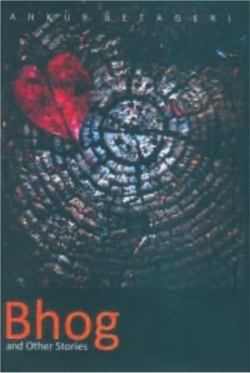| Home - Back Issues - The Team - Contact Us |
 |
| Volume 10 |Issue 34 | September 09, 2011 | |
|
|
Book Review On Human Bondage ZAFAR ANJUM
In Ankur Betageri's debut collection of short stories, Bhog and Other Stories, the last story, Malavika, is about a Bangalore-based materialistic girl. The eponymous character, Malavika, is befriended by the narrator—a writer and a friend of the young college-going student. The writer shows that Malavika is confused about life. Once Malavika and the narrator go to a hospital to donate blood. The doctor does not allow Malavika to donate her blood because of her having a low count of red blood cells. Malavika turns sad at this rejection and the narrator reads her a poem to cheer her up. She cuts him off in the middle of the narration and tells him that he should publish books and seriously consider writing novels. The narrator muses: “Only when a person's capacity is expressed in the form of a product or a service can one give it the value of money—only things having money value can have any value. I realized that this philosophy was behind all her talk and action.” Moreover, Malavika advises the young poet to exercise 'emotional discipline', implying that one should express oneself at the right places only, where 'the expression' could be monetised. In this story, Ankur is alluding to the marketisation of feelings and their commoditised modes of expression in our world. Later on in the story, Malavika seems to suffer from a nervous breakdown. She can't understand her own suffering. She meets up with the narrator. “Look, there is a deep lack of love in this world,” he consoles her. “Like most people who have adjusted themselves to the dehumanising conditions of the capitalistic system even you have lost the ability to love someone with all your heart; to accept someone with all your being. While a small portion of your brain shows a little love and sympathy, the rest of your brain becomes busy calculating like a businessman.” “Feeling is not our weakness—it is a sign of our humanity,” the narrator reminds Malavika. Obliquely, perhaps Ankur wants to tell us all about our materialistic madness and paranoia—our undesirable sufferings, the postmodern crisis of meaning in life. And Ankur should know it—he has a Masters degree in clinical psychology. Like Malavika, most of the stories in this collection are about the dilemmas of life that characters in cities and villages face, until a transforming moment comes in their lives that imparts them a rare insight. The characters, and through them the readers, woven by Ankur in these stories are rewarded with epiphanies that somehow lessen the burden of life, for life invested with meaning becomes less painful. Psychology, philosophy, and ancient wisdom form the framework for the screen on which Ankur throws his beam of imaginary characters that fashion his curious world. The resulting tales sometimes take strange, allegorical forms and depending on her taste, a reader could find it interesting or boring. In essence, his stories demonstrate the fight between the spirit and the matter. In The Source of the Stream, a character thus summarises the modern man: “Modern man … (is) nothing more than an animated corpse—he has become a zombie. He is spurious, narcissistic, shallow and this has forced him to become sensational, for he can be nothing else…Sensationalism is the artificial spirit of the dead age. And if no one wakes up from this slumber of cynicism there is the unthinkable possibility of forgetting the very presence of Spirit, the Spirit in which is found the depth of our true joys and sorrows.” Bhog is the most accomplished story in this collection of many insightful stories. Though the stories here are of uneven quality and they could have been better edited, each one of them leaves you with a thought or an insight. Overall, Bhog and Other Stories could be a rewarding read for those readers who want more than mere entertainment in their reading material.
Copyright
(R) thedailystar.net 2011 |
